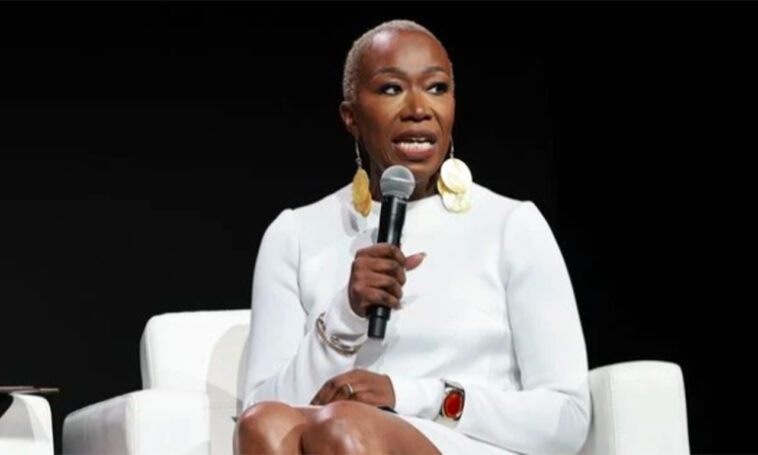MSNBC host Joy Reid stirred controversy on Sunday by advising White women not to invite Black women to protests against President-elect Donald Trump, saying that many Black women have “resigned” from efforts to “save America” following the presidential election. In a TikTok video, Reid explained that Black women are now focused on issues specific to their own communities, such as supporting Black men, businesses, and prioritizing Black spaces. Her comments reflect growing frustration among some Black women who feel their contributions to political movements have been overlooked or taken for granted. Reid’s statement comes amid growing calls for more inclusion and attention to racial issues within political protests.
On Sunday, MSNBC’s Joy Reid sparked a heated discussion with her comments about Black women’s involvement in political protests, particularly those organized by White women. In a TikTok video, Reid openly addressed White progressive women planning to protest against President-elect Donald Trump, telling them not to expect Black women to join their efforts.
“I’m just gonna tell you right now: They’re not coming,” Reid said bluntly. “I’m pretty sure Black women have resigned from the ‘save America’ coalition, ‘save democracy’ coalition and definitely the ‘save the Democratic Party’ coalition.”
Reid’s message was clear: Black women, according to her, are no longer interested in participating in political movements that focus primarily on preserving or reforming American institutions that have historically marginalized them. She suggested that White women should keep their protest plans “among their own friends” and not expect Black women to rally behind causes that do not address their specific needs and concerns.
Reid went on to say that Black women have shifted their focus from saving broader political institutions to prioritizing their own communities. “I think Black women are now on the ‘save Black women,’ ‘prioritize Black men’ and ‘prioritize Black communities, Black businesses’ and … you know, the Black spaces,” Reid explained. “But ‘save America,’ ‘save the Democratic Party’ – yeah, I don’t think that’s happening.”
Her comments come in the wake of frustration voiced by some Black women who feel their contributions to political movements have been sidelined, particularly in the context of the 2020 election. While Black women were crucial in securing Joe Biden’s victory, particularly through their overwhelming support for Vice President Kamala Harris, there is a growing sentiment that the political establishment, including the Democratic Party, takes Black voters for granted without adequately addressing their needs.
The 2020 election saw Black women make up about 6% of the overall electorate, according to the Associated Press. Of those, a staggering 89% cast their votes for Biden and Harris, while only 10% supported Trump. Despite being a key voting bloc, Black women have expressed frustration over the lack of policy changes that specifically address their concerns, including issues like criminal justice reform, healthcare access, and economic inequality.
In contrast, White women made up a significant portion of the electorate, representing 40% of voters in the 2020 election. Of these, 46% supported Biden and Harris, while 53% cast their ballots for Trump. This split between White women voters is significant, considering the historical role that White women have played in progressive movements. Reid’s remarks seem to be a response to what she sees as a disconnect between the activism of White women and the lived experiences of Black women in America.
Reid’s comment also reflects a broader trend among some communities of color who have grown disillusioned with the traditional political establishment. The Women’s March in 2017, which took place the day after Donald Trump’s inauguration, attracted over 500,000 people in Washington, D.C. The march was initially seen as a major act of resistance to the new president’s policies. However, the event faced criticism in later years for a perceived lack of inclusion of issues affecting women of color, especially Black women. Some activists have argued that the march and similar protests often fail to address the intersectional issues that disproportionately affect marginalized communities.
In the wake of these concerns, some Black women have expressed the desire to focus their energies on movements that directly address the issues they face, rather than continuing to participate in broader protests that do not center their experiences. As Reid put it, Black women are more interested in “save Black women” campaigns, which prioritize the well-being and empowerment of Black communities.
Despite the criticism from some on social media, Reid’s comments have sparked an important conversation about the inclusivity and direction of progressive political movements. It is clear that many Black women, who played a pivotal role in the 2020 election, feel that their voices and concerns have been marginalized within mainstream political spaces. As the nation moves forward, it remains to be seen whether these frustrations will lead to a shift in how political movements approach issues of racial justice and inclusion.
Reid’s statement is a reminder that the political landscape in America is evolving, and that the needs and priorities of Black women cannot be overlooked in the pursuit of broader social change. As she said in the video, “Black women are now on the ‘save Black women’ mission,” signaling a shift toward a more self-determined, community-centered approach to activism.
“Black women are now on the ‘save Black women’ mission,” Reid declared, emphasizing the need for a shift in focus toward the empowerment of Black communities.





Join the Community and Be a Part of the Conversation
You must be logged in or registered to post a comment.